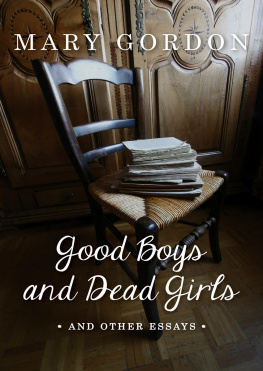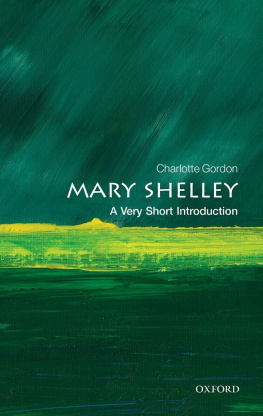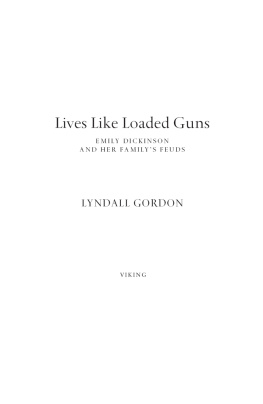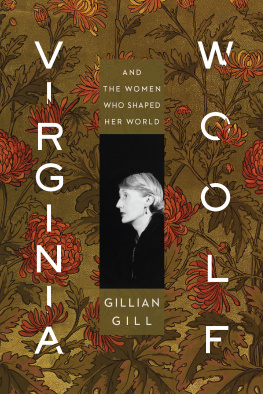PRAISE FOR
Outsiders
As the role of women undergoes yet another convulsion, its good to read of five women who made a powerful contribution.
Joan Bakewell, The New Statesman
It was a relief, really exhilarating to read Outsiders. Gordons composite biography brings to light the overlaps between the lives of five visionary women in their quest to give expression to truths that their original natures allowed them to perceive.
Fenuala Dowling, Aerodrome
Gordon succeeds in showing not only the pain but the possibilities of the outsider. While distinctive in their voices, these writers converge in their hatred of our violent world, exposing domestic and systemic violence. Their strength of spirit shines from the pages and through the ages.
Anita Sethi, Observer
Through sensitively recounted biographical details and literary readings, Gordon seeks to understand how these women became writers despite the obstacles in their way, and creates a web of connections, effected in part by their reading of each others works, and the writings of Mary Wollstonecraft.
Gail Marshall, Times Higher Education
I love how Lyndall Gordon thinks and I love the clarity and reach of her writing, combining imaginative audacity with scholarly scruple. Her Outsiders builds into a lucid meditation on how certain writers become lighthouses for each other.
Joseph OConnor, Irish Times
[A] stunning portrait of Woolf... one of the most sophisticated explorations of Woolf available and a perfect introduction for students and general readers alike.
The Virginia Woolf Bulletin
A lively and enterprising group biography
Catherine Taylor, The Financial Times
A biographer of the imagination.
Frances Wilson, Mail on Sunday
The visionary, beautiful Outsiders.
Karina Szczurek, South African Sunday Times
Impeccably researched... an excellent read.
The Lady
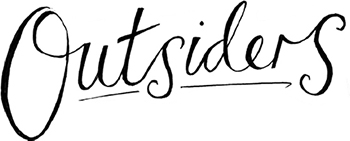
Also by Lyndall Gordon
THE IMPERFECT LIFE of T. S. ELIOT
VIRGINIA WOOLF: A WRITERS LIFE
SHARED LIVES
CHARLOTTE BRONT: A PASSIONATE LIFE
HENRY JAMES: HIS WOMEN AND HIS ART
VINDICATION: A LIFE OF MARY WOLLSTONECRAFT
LIVES LIKE LOADED GUNS: EMILY DICKINSON AND HER FAMILYS FEUDS
DIVIDED LIVES: DREAMS OF A MOTHER AND DAUGHTER

First published in Great Britain in 2017 by Virago Press
First published in the United States in 2019 by Johns Hopkins University Press
2 4 6 8 9 7 5 3 1
Copyright Lyndall Gordon 2017, 2019
The moral right of the author has been asserted.
Printed in the United States of
America on acid-free paper.
All rights reserved. No part of this publication may be reproduced, stored in a retrieval system, or transmitted, in any form or by any means, without the prior permission in writing of the publisher, nor be otherwise circulated in any form of binding or cover other than that in which it is published and without a similar condition including this condition being imposed on the subsequent purchaser.
Johns Hopkins University Press
2715 N. Charles Street
Baltimore, Maryland 21218-4363
www.press.jhu.edu
Library of Congress Control
Number: 2018955300
ISBN 978-1-4214-2944-1 (hardcover : alk. paper)
ISBN 978-1-4214-2945-8 (electronic)
ISBN 1-4214-2944-6 (hardcover : alk. paper)
ISBN 1-4214-2945-4 (electronic)
Special discounts are available for bulk purchases of this book. For more information, please contact Special Sales at 410-516-6936 or .
Johns Hopkins University Press uses environmentally friendly book materials, including recycled text paper that is composed of at least 30 percent post-consumer waste, whenever possible.
For Paula Dietz
who upholds the civilisation the writers in this
book imagined for our future
Souls live on in perpetual echoes
George Eliot, Middlemarch
LIST OF ILLUSTRATIONS
FOREWORD
Like many as a child, I made friends with characters in books. Its a strange tie between reader and writer. We come to know a lasting poet or novelist more intimately than we do people of our own place and time; closer in a way than love and friendship. Growing up in a provincial town, I was drawn to outsiders and especially to girls like Maggie Tulliver in The Mill on the Floss, a restless, intelligent girl who cannot find a home for her aspiring nature much like her creator, George Eliot herself. Later, I loved Virginia Woolfs sightings of the night where she sees into hearts and minds of outsiders whose shadow-selves fade in the glare of day. I was a convert to Emily Bronts full-throated contempt for the world without in favour of the world within. All were outsiders during their lifetimes, and painful though this was, their separations from society did release what they had to say.
As a child with an ill mother, I knew about pity for those set apart; but at the same time I was struck at an early age by the possibilities of the outsider who, like my mother, could use her apartness to see the world afresh. The outsiders who have meant most to me tell us not who we are, but who we might be.
I have chosen five extraordinary outsider voices rising in the course of the nineteenth century: a prodigy, a visionary, an outlaw, an orator and an explorer. To my mind, they came, they saw and left us changed. Each differs in her own place and situation, but what Mary Shelley, Emily Bront, George Eliot, Olive Schreiner and Virginia Woolf also have in common is the way they inform one another, and us, across the generations. All five were readers before they became writers, which is to say each heard those who came before her in a chain of making. I want to look at the links in this chain as each successive woman brings to birth a new genus. On 2 January 1846, when Emily Bront was writing Wuthering Heights, her unfettered voice powers its way past its time. She declares, No coward soul is mine. The American poet Emily Dickinson, taking in that voice in 1881, and Virginia Woolf, hearing it in 1925, seize on the same word: this writer is gigantic.
Im curious how an outsize voice came to each of the five writers. How did they become writers despite the obstacles in a womans way? Their lives appeared changeable to the point of metamorphosis. It was improbable that Mary Godwin at the age of sixteen should have found a great poet, Shelley, keen to encourage her wish to write. It was improbable that Emily Bront should have had two sisters of congenial genius who contrived to publish her almost against her will. Doctors and nurses did not expect Virginia Woolf to recover from her mental illness in 1915, let alone emerge in the 1920s as a leading novelist. George Eliot could have been an evangelical teacher; Olive Schreiner could have remained a governess.
In each, I see at the outset of their lives a shadowy being, half-awake to untested potency, surfacing in a letter or murmuring to herself in her journal, but always improvising, indeterminate, as she veers from the path laid out by custom. Passion was part of their emergence, as was sexuality: George Eliot fell for a man who could not love her in the way she wished. Mary Godwin (later Mary Shelley) was headlong in her love for a poet to whom, she felt, she could unveil all she was. Olive Schreiner was explicit about arousal, extraordinarily so for a single woman in the 1880s, to the future psychologist of sex, Havelock Ellis, who made notes as she spoke.


